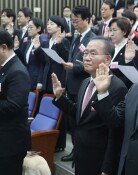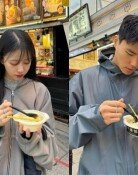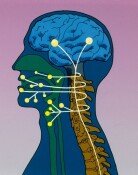Sogang School vs. Sogeumhoi
The economic power elite group that cannot be separated from the late former President Park Chung-hee during Koreas development era is the Sogang School. Professors of Sogang University accounted for a majority of the economic bureaucrats who spearheaded the "Miracle of the Han River" in the 1970s. The late former Prime Minister Nam Deok-woo, a first-generation Sogang School member who believed in growth and built the skeleton of the Park Chung-hee administrations chaebol-focused, export-driven, and pro-growth and post-distribution economic policies, and former Deputy Prime Ministers Lee Seung-yoon and Kim Man-je constituted the so-called Troika of the Sogang School."
Kim Jong-in, former lawmaker of the Democratic Party who contributed to the birth of the Park Geun-hye administration, is a member of the second-generation Sogang School along with former Education Minister Kim Deok-joong. Graduates of Sogangs economics department inherited the tradition to form the third-generation Sogang School. These include Kim Gwang-doo, president of the Institute for Future Studies, Kim Kyung-hwan, president of the Korea Research Institute for Human Settlements, Prof. Nam Seong-il of Sogang University, and Lee Deok-hoon, president of the Export Import Bank of Korea. Since the Asian financial crisis in 1997, the Sogang School has clearly seen its influence wane. During the Roh Moo-hyun administration that emphasized distribution, critics would claim the end of the Sogang School.
As graduates of Sogangs business and economics departments began making inroads into financial firms, the term "Yeouido Sogang School" was coined to describe the universitys alumni who are working in the Yeouido financial district in Seoul. The Sogang Financiers Club (Sogeumhoi) that was launched in 2007 is comprised of more than 300 officials above the team leader level from banks, securities companies, insurance firms and credit card companies. When drinking boilermaker, they propose a toast by chanting So!, So!, So! (stand, stand, stand) to urge Sogang alumni to stand tall. This alumni group is in a different dimension from the members of the Sogang School, who were fiercely agonizing over the nations future during the Park Chung-hee administration.
Lee Gwang-goo (business management major who entered the university in 1976), vice president of Woori Bank and a former Sogeumhoi member, is competing for the post of Woori Financial Group Chairman, which the incumbent chair Lee Soon-woo was likely to remain. Hong Seong-gook (politics and diplomacy major who entered the university in 1982), vice president of Daewoo Securities, has been nominated as the president of the company, a post that remained vacant for the fourth month. We wonder if Hong Ki-taek, chairman of the Korea Development Bank Financial Group (economics major who entered the university in 1971) and Lee Deok-hoon (mathematics major who entered in 1967), president of the Export Import Bank of Korea, would have taken the posts if they had not been Sogang alumni. During the Lee Myung-bak administration, there was a term, "the Four Kings" of Korea University alumni. Members of Sogeumhoi may as well seek to defy accusations against them, saying that it should not be a problem if they join forces at a time when they are bashed by alumni of SKY (Seoul National, Korea, and Yonsei universities). However, the practice of enjoying influence under those in power (President Park Geun-hye is a Sogang alumnus) by resorting to school affiliation and relationship is outdated at best.







